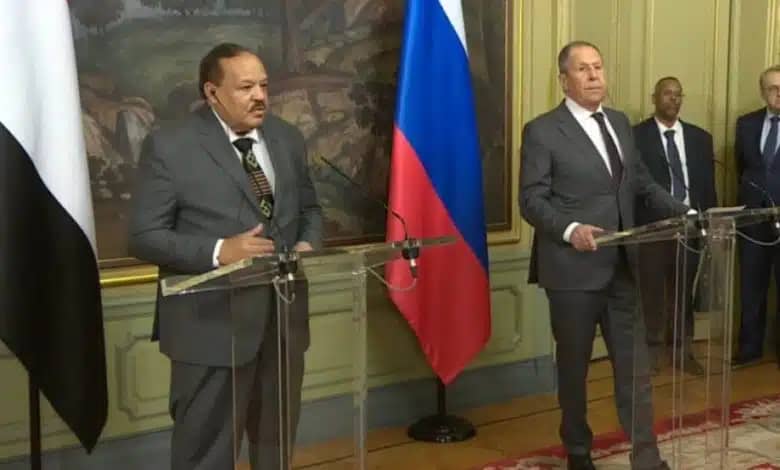The Russian Base in the Red Sea: Political or Economic Transit?

Report by Nazik Shammam
The Sudanese government views Russia as a strong ally supporting its political stance as it wages a war nearing its second year against the Rapid Support Forces (RSF) militia. At the same time, hopes are rising between the two countries that their alliance will lead to significant economic openness, strengthening their political ties. This is evident in Sudanese Foreign Minister Ali Youssef’s current visit and his discussions with his Russian counterpart, Sergey Lavrov, which have brought back to the forefront the old agreement to establish a logistical support point on Sudan’s Red Sea coast.
This agreement, reignited by Youssef’s statements in Moscow, is not new. It was initially signed in 2017 during the tenure of former President Omar al-Bashir and stipulated that Russia would build and operate a naval logistics support point in the Red Sea for the Russian fleet. However, after the Sudanese army took control following Bashir’s ouster, the agreement was put under review.
Sudan’s ambassador to Russia, Mohamed Al-Ghazali Al-Tijani Siraj, confirmed that the widely discussed agreement on establishing a Russian military base in Sudan’s Red Sea region is the same old agreement, officially termed a “material and logistical support point.” He stated that the agreement still exists and is viewed by both countries within the framework of their evolving bilateral relations, as both see mutual benefits in developing their ties in this area.
For Sudan, the key issue at the moment is what the news website Al-Mohaqiq reported from the Sudanese ambassador in Moscow: Russia has expressed its willingness to participate—through both the public and private sectors—in Sudan’s reconstruction efforts following the extensive destruction of its infrastructure due to systematic attacks by the terrorist RSF militia. The ambassador emphasized Russia’s significant capabilities and Sudan’s vast resources, expecting Russian contributions in vital sectors such as energy, oil, and mining. He also noted that government institutions are already being prepared for collaboration and that a joint ministerial committee will soon convene in Port Sudan, featuring major public and private companies with substantial expertise in these fields.
The mining sector is at the forefront of Russian economic interests in Sudan. Russian companies are eager to operate in mining areas within safe states after the war. Last September, a Russian Chamber of Commerce delegation met with Sudanese officials to discuss arrangements for gold extraction in multiple locations, starting in October. On June 7 of last year, Sudan’s Ministry of Minerals signed an agreement with the Russian company Zarubezh for gold exploration and extraction in Block (NS-A-24).
Al-Tijani reaffirmed that Sudan builds its relationships based on mutual interests and fair exchanges without exploitation. He stated that Russia aligns with this approach in its foreign economic relations, adding, “We are open to any country—Western or otherwise—as long as it respects these principles in its dealings with us.” He further highlighted Russia’s steadfast support for Sudan during its crisis, emphasizing that this understanding of Sudan’s situation positions Russia among the top priority countries for investments and partnerships across various sectors.
However, economic expert Dr. Mohamed Ali Torshin believes that there are no significant economic benefits to be gained from establishing a Russian military base on the Red Sea coast. He cited several factors, including Russia’s relatively limited production and marketing capabilities compared to Western countries.
In an interview with Al-Mohaqiq, Torshin pointed out that Russia excels in defense and military industries, ranking among the top arms exporters, particularly to African nations. He explained that the main benefit for Sudan from this base would be military-related, particularly in securing weapon supplies for the Sudanese army in the ongoing war.
He emphasized that Sudan needs to expand its relations beyond Russia to diversify its economic resources, engaging with multiple countries across Asia and the European Union.
Meanwhile, economic analyst Dr. Haitham Mohamed Fathi noted that Russia maintains over 30 military bases outside its borders, primarily within former Soviet territories. He explained that Moscow is continuously seeking opportunities to enhance its military presence in Asia and Africa, adding, “This would not only strengthen military cooperation but also foster political and economic ties with these nations.”
He stressed Sudan’s strategic significance, not only regionally but also in global geopolitics, as it would provide Russia with a logistical support point on the Red Sea coast. Speaking to Al-Mohaqiq, Fathi added, “Given the numerous trade routes passing through these waters, Russia will be keen to expand its influence in this direction, especially with many other powers, such as Gulf countries and China, also aiming for a naval presence in Sudan.”
Fathi suggested that Russia’s presence in Sudan could enable it to compete with the United States and China in the region. However, he also pointed out Russia’s increasing economic burdens due to Western sanctions over the Ukraine war and the costs of maintaining foreign military operations.
He explained that these pressures might force Moscow to scale back its military expenditures and focus on domestic challenges while simultaneously seeking to strengthen economic relations with Red Sea nations through investment agreements and economic cooperation.
Fathi also revealed ongoing Russian-Sudanese discussions about investment in oil, gas, and minerals, describing Sudanese-Russian relations as akin to a “political transit station.”
Source: Al-Mohaqiq News Website



